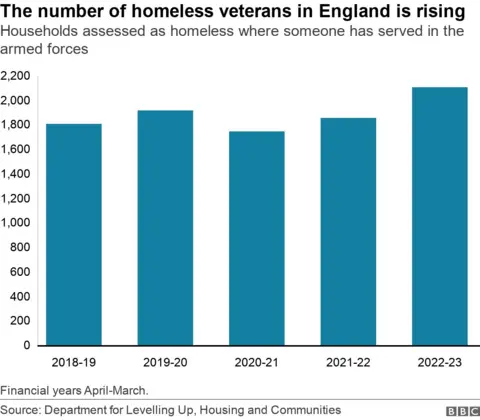Was minister right in veterans row with Vorderman?
 Getty Images
Getty ImagesVeterans' Affairs Minister Johnny Mercer says he is taking a break from X following a row with presenter Carol Vorderman.
They had spent days arguing on the social media platform about homelessness among veterans and whether Mr Mercer had promised to eradicate it in 2023.
So who was right?
What was pledged?
On 27 December, the former Countdown numbers expert tweeted that "Mercer swore he'd END veterans' homelessness in 2023" and linked to a Guardian article saying that homelessness among veterans in England was up 14%.
Mr Mercer responded saying he had "made a very clear promise on ending veterans sleeping rough".
Ms Vorderman pointed towards an interview on LBC in February in which Mr Mercer said "we are going to end veterans' homelessness this year".
But in the interview he also said "by the end of this year, I don't want to see a single involuntarily sleeping rough homeless veteran in this country".
In December 2022, Mr Mercer launched a scheme called Operation Fortitude to help veterans find accommodation.
Since then, he's talked about both ending veterans' rough sleeping and ending veterans' homelessness.
In this tweet from January 2023, he said: "I'm deadly serious about ending veterans homelessness in the UK this year."
A government press release explaining Operation Fortitude talked about tackling rough sleeping and homelessness among former armed forces personnel. It said the aim was "to ensure no veteran should sleep rough this Christmas, and veteran homelessness is ended in 2023".
The press release also referred to the pledge in the Veterans' Strategy Action Plan 2022-24 to end veteran rough sleeping within this Parliament. And that document is very clear that what it's talking about is rough sleeping.
What is the difference?
The government says that to sleep rough is to bed down in the open air or inside a building not fit for habitation.
But not all homeless people are sleeping rough.
The government's definition of homelessness is a household that does not have a home available or one that is fit to occupy.
While that includes people sleeping rough, it also includes people such as those who:
- have a place to sleep but it is only temporary such as in a shelter or B&B
- are staying with family or friends
- are in inadequate housing such as caravans on illegal campsites or in extreme overcrowding.
The government guidance says: "The term 'homelessness' is often considered to apply only to people 'sleeping rough'. However, most of our statistics on homelessness relate to the statutorily homeless, ie those households which meet specific criteria of priority need set out in legislation, and to whom a homelessness duty has been accepted by a local authority."
What do the figures show?
As part of his response to Ms Vorderman, Mr Mercer tweeted: "I made a very clear promise on ending veterans sleeping rough because of a lack of provision, this year. I met that promise."
We asked the Cabinet Office, where Mr Mercer works, how that pledge had been met.
It said what he meant was that the veterans who had called a hotline through which they could access Operation Fortitude had been helped off the streets and that there were facilities available if any other rough-sleeping veterans were to call.
Mr Mercer said the scheme had housed 400 veterans so far.
Local authorities estimated that 27 veterans were sleeping rough in England between May and September this year.
On the broader measure of homelessness, we have figures going back to 2018 for the number of households in England assessed as homeless, where somebody had served in the armed forces.
In the last full year for which we have figures - 2022-23 - that went up 14% to 2,110 - as reported by the Guardian.

These figures only go up to the end of March 2023. There are no publicly available figures for the whole of 2023, so we do not know if veterans' homelessness was ended by the end of this year. We have asked the government whether it was.
The latest quarterly figures show that there were 530 households including veterans assessed as homeless in England between April and June 2023.
The government says quarterly figures up to the end of 2023 are due to be published in April 2024.
The figures in the article are for England as homelessness is a devolved issue.


